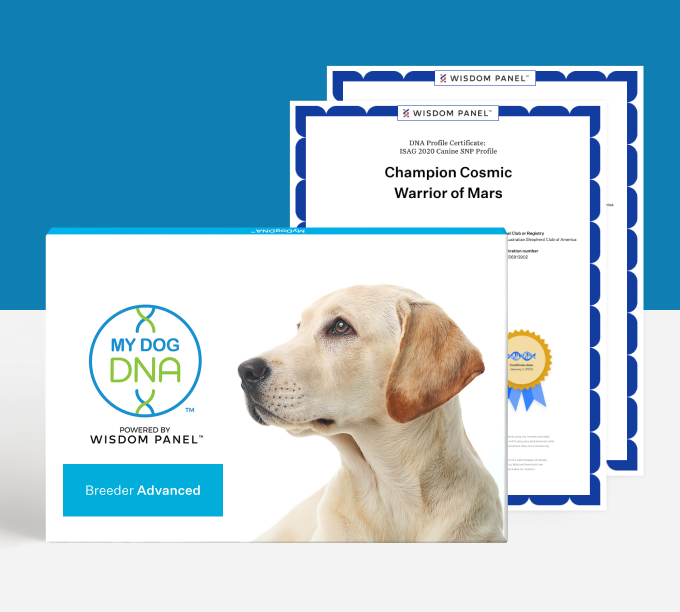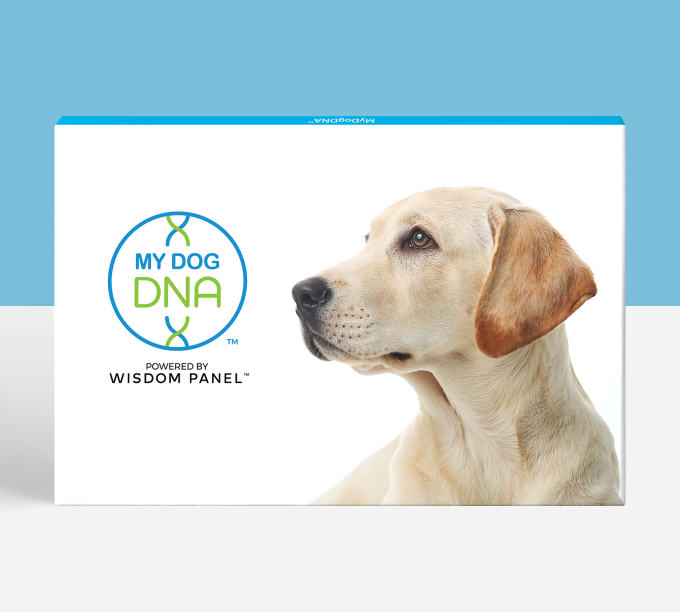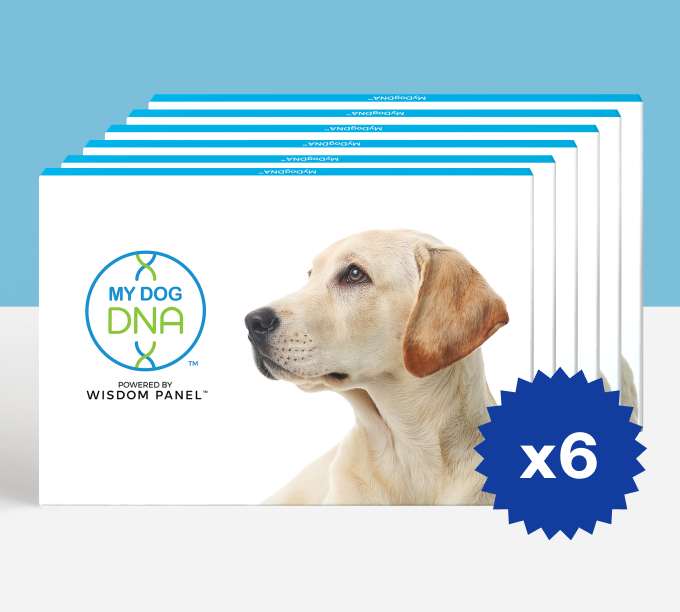Parentage testing is a highly accurate method of using DNA profiles to verify or exclude parent-offspring relationships. Wisdom Breeder is excited to offer canine parentage testing as a free service for all MyDogDNA™ and Optimal Selection™ Canine kits with DNA profiling starting in June 2024. This service is not available for Wisdom Panel™ ancestry tests. Read on to learn how parentage works and when to use it in your breeding program.

What is parentage testing?
Parentage testing is an analysis of candidate sire, dam and offspring DNA to exclude biological relationship. If the relationship is not excluded, it is highly likely they qualify as parent and offspring. It can be performed on any parent-offspring combination if candidate bitch or dog, as well as puppies, have the same DNA profiling type performed. Wisdom DNA profiling is performed using the International Society for Animal Genetics (ISAG) 2020 standard panel. Parentage testing is regularly used in people and domestic livestock species to legally confirm biological parents, as it is highly reliable analysis.
When to use parentage testing, and why
Most often, parentage testing is used to verify the biological sire of a litter. Because bitches can remain receptive for an extended period when they are in estrus, multiple dogs can mate with her, producing litters with 2 or more sires. Many registries will accept registration of dual sire litters with appropriate parentage testing of puppies to identify and confirm the father.
Verifying the correct parents of a dog can be of critical importance in ensuring that dogs are indeed clear by parentage for a given disorder. Similarly, when tracing a pedigree to determine the source of an emerging disorder, the accuracy of the breeding record is paramount. Parentage analysis is the most widely accepted method of checking the accuracy of the pedigree. Parentage testing also provides reliable confirmation of the pedigree in instances in which the breeding record is challenged, protecting breeders and pet owners against fraud.
How does parentage testing work?
All DNA is inherited by offspring as chromosome sets, with half of a chromosome pair donated from each parent, with the exception of sex chromosomes. DNA profiling using an internationally standardised marker set such as the ISAG 2020 SNP parentage panel ensures that all tested dogs were tested for the same markers and marker type at the same locations (loci).
As each marker in the offspring’s DNA profile is analysed, the offspring’s DNA should either be represented by the tested mother or the tested father’s DNA. Historically, with older parentage panels, DNA profiles for both parents were required to complete the analysis. However, due to the size and robustness of the new ISAG 2020 panel, single-parent or one-sided parentage analyses can be performed if necessary. For highest confidence, Wisdom still recommends testing both parents, and if the mating is in a very low genetic diversity breed or the breeding was of closely related dogs, single-parent analysis is not advisable.
If enough markers in the offspring do not match the candidate parent’s markers, then the tested parent is excluded as the biological parent. Wisdom’s parentage testing excludes, or by default, qualifies a potential parent with high confidence, even in instances of close relationship of candidate sires. Wisdom’s parentage can be performed on multiple offspring-parent combinations if needed to confirm the biological parent.
3-Generation Model of DNA Inheritance:

If enough markers in the offspring do not match the candidate parent’s markers, then the tested parent is excluded as the biological parent. Wisdom’s parentage testing is based on exclusion probability. A qualifying result means the parent-offspring pair were not excluded, and is powerful enough to correctly verify a potential parent with high confidence, even in instances of close relationship of candidate sires. Wisdom’s parentage can be performed on multiple offspring-parent combinations if needed to confirm the biological parent.
One Potential Parent Matches, One Does Not Match Offspring:

How to use Wisdom's parentage tool
Wisdom's parentage testing tool is a free service available to all Wisdom breeders who have purchased DNA profiling for their dogs with MyDogDNA™ and Optimal Selection™ Canine testing. Any parent or offspring to be analysed must have DNA profiles in the Wisdom database to perform parentage testing. At this time, only dogs within your account can be compared for parentage.
If you wish to perform parentage testing, but your dog does not yet have a DNA profile, it may be available as an upgrade without retesting. Dogs eligible for upgrade will be indicated in your account for an additional fee. If your dog is not eligible for upgrade, a new MyDogDNA™ or Optimal Selection™ kit with DNA profiling must be purchased and your dog re-sampled in order to test the required markers for ISAG 2020 profiling. If parentage testing is required by your registry, please check their sampling requirements in advance (e.g. vet verification documentation) to ensure your dog’s parentage testing report will be accepted. Please note that veterinary verification is not yet supported in Wisdom DNA profiling or parentage analyses. All ordered parentage tests will be permanently saved to your account for later retrieval. As with health testing results, sharing settings can be set to make profiling and parentage results viewable by others or private.
Steps to order parentage analysis:
- At the top of your account, click on the “Breeder Toolkit” icon
- Select “Parentage analysis”
- Select species “Dog” and offspring to test. Ensure that if you are selecting more than one offspring, that they are from the same dam or sire’s litter. You can always perform additional analyses for other dogs if needed.
- Select candidate sires and dams. You can select multiple sires and dams, or just one. You can always repeat the analysis with other dogs if needed. Just keep in mind that for every additional candidate parent added, additional parentage reports will be generated. E.g. 4 puppies, 2 candidate dams, 2 candidate sires will generate 4 x 4 = 16 reports.
- Enter owner and breeder information as you wish for them to appear on the report. Typos cannot be corrected once the report is generated, so ensure accuracy of information before submitting, otherwise you’ll need to repeat the parentage analysis request to generate a new report.

Once the requested parentage analyses are completed, parentage certificates will be viewable within the “Reports” tab in your account, along with all DNA profile certificates and detailed DNA profile reports.

Parentage certificates will indicate that the selected parent(s) qualify as the biological parents of the offspring tested, or that one or more parents is excluded as a parent.
What if I realise there is a problem?
That’s what parentage testing is for! Congratulations on finding and correcting any inaccuracies in your records. There’s two common sets of problems. One is an error in either the submission or processing of the DNA samples, the other is a true biological parent-pedigree error requiring an update to the pedigree.
The most common scenario is that the sample as it was submitted was activated or labeled with incorrect information at home, most often swapped with another dog submitted at the same time. In that case, the DNA profile is actually not that of the dog in question. If you suspect this is the case, it is best to contact Customer Service prior to parentage testing to determine the nature and source of the problem so it can be corrected. If you realise there is a problem after generating parentage testing reports and suspect a sample error, please contact Customer Service to discuss and determine a plan to correct the problem.
If sample errors are ruled out, and parentage analysis excludes an expected parent, this candidate parent is unlikely to be the biological one. Please notify Wisdom prior to contacting your registry if you will need to update your dog’s pedigrees, so we can answer any questions you might have and conduct a secondary analysis if needed. The rare exception in which parentage testing provides a conflicting result is in cases of chimerism, in which the parent has more than one set of DNA in their body, and the DNA in their sperm/ova does not match the DNA in their blood or cheek swab sample.
What parentage testing doesn’t do
Parentage testing is a powerful tool to evaluate biological relationships through DNA and ensure the accuracy of your pedigrees. However, there are things you might want to know about your dog’s DNA that it will not tell you. Due to genetic recombination, parentage testing is only valid between a parent and direct offspring. It cannot confirm or deny parentage if generations are skipped, e.g. grandparents and their offspring’s offspring. Parentage does not determine breed, or if your dog is purebred. Parentage also doesn’t screen for traits, disorders, or genetic diversity. If you are planning to breed your dog, please ensure you also test your dog with one of Wisdom’s breeder products for best health.








